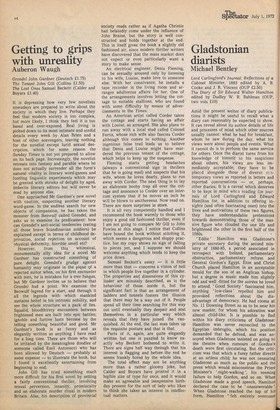Getting to grips with unreality
Auberon Waugh
Grendel John Gardner (Deutsch £1.75) The Tenant John Gill (Collins £1.50) The Lost Ones Samuel Beckett (Calder and Boyars £1.40) It is depressing how very few novelists nowadays are prepared to write about the society in which they live. Perhaps they feel that modern society is too complex, but more likely, I think they feel it is too banal and over-exposed. Real living is picked down to its most intimate and sordid details every week by Alan Brien and a host of other scavengers, leaving nothing for the novelist except lurid sexual description, which for some reason the Sunday Times is not yet prepared to allow on its back page. Increasingly, the novelist retreats into fantasy and parable where he does not actually surrender all the form's natural vitality in literary word-games and footling linguistic experiments which may be greeted with shrieks of delight by aged, imbecile literary editors but will never be read by anyone else.
One approached Mr Gardner's new novel with caution, suspecting another literary word-game. In the endless search for new objects of compassion, he has taken the monster from Beowulf called Grendel, and asks us to examine its predicament: how can Grendel's anti-social tendencies (eating all those brave Scandinavian soldiers) be explained except in terms of childhood deprivation, social rejection on account of physical deformity, horrible smell etc?
However, from this whimsical, monumentally silly idea for a novel Mr Gardner has constructed something of pure delight. Grendel's grudge against humanity may originate in the pique qf a rejected suitor when, on his first encounter with men, he is mistaken for a tree fungus, but Mr Gardner invites us to believe that Grendel had a point. We examine the Beowulf legend for a start, and through it all the legends with which mankind sustains belief in his intrinsic nobility, and see the whole structure as a pack of lies. Squalid, bloodthirsty encounters between frightened men are built into epic battles; ignoble and furtive lusts become by the telling something beautiful and good. Mr Gardner's book is as funny and as elegantly written as anything I have read for a long time. There are those who will be irritated by the meaningless doodles of someone called Emil Antonucci who has been allowed by Deutsch — probably at some expense — to illustrate the book, but I found it excellently entertaining from beginning to end.
John Gill has tried something much more difficult for his first novel by setting a fairly conventional thriller, involving sexual perversion, insanity, promiscuity and an elaborate murder ritual in modern Britain. Alas, his description of provincial society reads rather as if Agatha Christie had belatedly come under the influence of John Braine, but the story is well constructed and holds together at the end. This in itself gives the book a slightly old fashioned air, since modern thriller writers have discovered that the mass market does not expect or even particularly want a story to make sense.
An electrical engineer, Denis Fleming, can be sexually aroused only by listening to his wife, Louise, make love to someone else. With her connivance, he installs a tape recorder in the living room and arranges adulterous affairs for her. One of the arrangements involves letting the cottage to suitable stallions, who are found with some difficulty by means of advertisements in the Times.
An American artist called Corder takes the cottage and starts having an affair with Louise, as arranged. She also plans to run away with a local stud called Colonel Ferris, whose rich wife also fancies Corder although this comes to nothing. Another ingenious false trail leads us to believe that Denis and Louise might have murdered the previous tenant of the cottage, which helps to keep up the suspense.
Fleming starts getting headaches (always a conventional sign in thrillers that he is going mad) and suspects that his wife, whom he loves dearly, plans to run away with Corder. The next thing is to lay an elaborate booby trap all over the cottage and announce to Corder over an intercom system that if he moves an inch he will be blown to smithereens. Now read on. There are more surprises in store.
It is all very competently handled and I recommend the book warmly to those who enjoy a good old fashioned thriller, even if I am not going to compare Mr Gill to John Fowles at this stage. I notice that Collins have bound the book without stitching it, which seems a dangerous and sloppy practice, but my copy shows no sign of falling to pieces yet, and I suppose we should welcome anything which tends to keep the price down.
Samuel Beckett's essay — it is little more than that — concerns a vision of hell in which people live together in a cylinder. The properties and dimensions of this cylinder are minutely described, as is the behaviour of those inside it, but the significant fact is that an arrangement of ladders and tunnels fosters the illusion that there may be a way out of it. People spend all their time searching for this way out until eventually they despair and seat themselves in a particular way which reveals that they have joined the vanquished. At the end, the last man takes up the requisite posture and that is that.
Parts of it, again, are quite elegantly written but one is puzzled to know exactly why Beckett bothered to write it. There are signs half way through that his interest is flagging and before the end he seems frankly bored by the whole idea.
The total effect may not be anything more than a rather gloomy joke, but Calder and Boyars have printed it in a legible size of type for once, and it would make an agreeable and inexpensive birthday present for the sort of lady who likes to think she takes an interest in intellectual matters.






















































 Previous page
Previous page